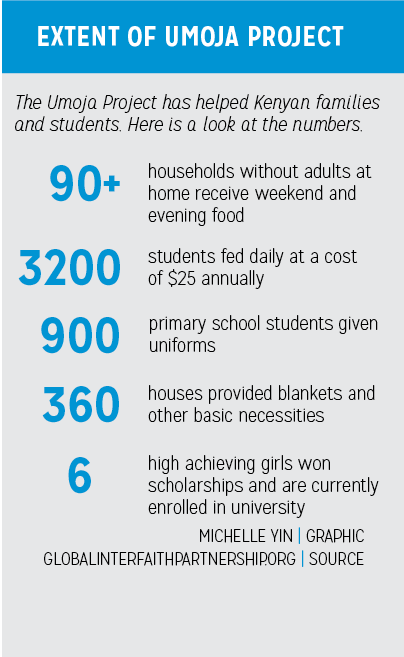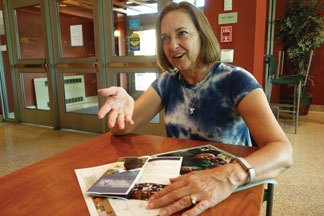Last June, two CHS students traveled to Kenya through a project called the Global Interfaith Partnership (GIP). For senior Jamie Goetz, Kenya Club president and senior, and junior Lainey Slack, Kenya club member and junior, this trip culminated years of devoting time and resources to help orphaned Kenyan children stay in school.
“Over (in Kenya), I could see (the project) full circle, how huge of an impact it’s making on these people’s lives,” Goetz said. “All of them live in a very impoverished state, and the only way that they can get out of it is through education.”
According to Celia Booher, Indiana Program Coordinator for GIP, the organization is geared to do just that. She said GIP, known to Kenyans as the Umoja Project, is a partnership between groups in Indianapolis and Chulaimbo, Kenya. Smaller branches of the organization at various religious congregations and schools around the Indianapolis, including Kenya Club, organize fundraisers to raise money and awareness that help support the Kenyan schools. Every other year, a group of GIP staff and students take a trip to Kenya to monitor the project.
Booher said, “Part of strengthening (GIP) is personal relationships. Our goal in Kenya was to spend time with the students and the guardians and the teachers there and really get to know what it’s like to be a Kenyan student.”
In regard to the trip itself, Slack said, “It was incredible; it was so amazing. I got to learn about the culture, and it was very eye-opening.”
Throughout their 16-day stay in Kenya, Goetz and Slack stayed in a Kenyan village among the GIP-sponsored students. Each day, they visited schools to observe how GIP’s school lunch, tuition and girls’ empowerment programs operate up close.
Booher said most of the children receiving aid from the GIP have lost one or both parents, often from AIDS. These children struggle to provide food, shelter and other basic needs for themselves and their siblings, which causes school to fall lower on their priority list.
“The teachers told us, ‘If you want the kids to go to school, you have to feed them.’ They’re missing school because they’re trying to go out and find food, and they can’t concentrate if they’re hungry. Now we feed 3,200 kids in 18 schools daily lunch,” Booher said.

Goetz said, “(People) don’t realize that in a lot of places in the world, if you don’t have education, you can’t get basically anywhere in life and you’re stuck in the cycle of poverty. I think it’s extremely important to do anything that we can to help people around the world get education.” not do it?”

































![AI in films like "The Brutalist" is convenient, but shouldn’t take priority [opinion]](https://hilite.org/wp-content/uploads/2025/02/catherine-cover-1200x471.jpg)









































![Review: “The Immortal Soul Salvage Yard:” A criminally underrated poetry collection [MUSE]](https://hilite.org/wp-content/uploads/2025/03/71cju6TvqmL._AC_UF10001000_QL80_.jpg)
![Review: "Dog Man" is Unapologetically Chaotic [MUSE]](https://hilite.org/wp-content/uploads/2025/03/dogman-1200x700.jpg)
![Review: "Ne Zha 2": The WeChat family reunion I didn’t know I needed [MUSE]](https://hilite.org/wp-content/uploads/2025/03/unnamed-4.png)
![Review in Print: Maripaz Villar brings a delightfully unique style to the world of WEBTOON [MUSE]](https://hilite.org/wp-content/uploads/2023/12/maripazcover-1200x960.jpg)
![Review: “The Sword of Kaigen” is a masterpiece [MUSE]](https://hilite.org/wp-content/uploads/2023/11/Screenshot-2023-11-26-201051.png)
![Review: Gateron Oil Kings, great linear switches, okay price [MUSE]](https://hilite.org/wp-content/uploads/2023/11/Screenshot-2023-11-26-200553.png)
![Review: “A Haunting in Venice” is a significant improvement from other Agatha Christie adaptations [MUSE]](https://hilite.org/wp-content/uploads/2023/11/e7ee2938a6d422669771bce6d8088521.jpg)
![Review: A Thanksgiving story from elementary school, still just as interesting [MUSE]](https://hilite.org/wp-content/uploads/2023/11/Screenshot-2023-11-26-195514-987x1200.png)
![Review: "When I Fly Towards You", cute, uplifting youth drama [MUSE]](https://hilite.org/wp-content/uploads/2023/09/When-I-Fly-Towards-You-Chinese-drama.png)
![Postcards from Muse: Hawaii Travel Diary [MUSE]](https://hilite.org/wp-content/uploads/2023/09/My-project-1-1200x1200.jpg)
![Review: "Ladybug & Cat Noir: The Movie," departure from original show [MUSE]](https://hilite.org/wp-content/uploads/2023/09/Ladybug__Cat_Noir_-_The_Movie_poster.jpg)
![Review in Print: "Hidden Love" is the cute, uplifting drama everyone needs [MUSE]](https://hilite.org/wp-content/uploads/2023/09/hiddenlovecover-e1693597208225-1030x1200.png)
![Review in Print: "Heartstopper" is the heartwarming queer romance we all need [MUSE]](https://hilite.org/wp-content/uploads/2023/08/museheartstoppercover-1200x654.png)




